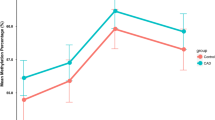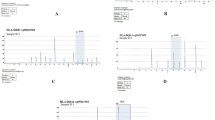Abstract
Background
ACS (acute coronary syndrome), a subgroup of coronary artery disease (CHD), is a leading cause of death worldwide. Reports shown the association between methylation and CHD, while the abnormal expression of C1QTNF1 (C1q and tumor necrosis factor related protein 1) in CHD patients, but the underlying mechanisms are still unclear.
Objective
To analyze the methylation of CpG sites of C1QTNF1 in ACS patients.
Methods
Peripheral blood samples were collected from healthy controls and ACS patients. The methylation of total C1QTNF1, promoter sequence and CpG sites of C1QTNF1 were measured using methylation detection kits. The outcomes were compared between patients and controls based on gender, clinical classification and clinical stages.
Results
The promoter sequences from 37 ACS patients and 20 controls indicate that the methylation rate of C1QTNF1 was significantly lower in male patients compared to healthy controls at + 63 CpG sites (p = 0.03). Whereas, the methylation rate of C1QTNF1 in female patients was significantly lower than female health controls at − 89, + 39 and + 167 CpG sites (p = 0.021, 0.042, 0.021). In addition, the methylation rate of C1QTNF1 was significantly higher in male patients than female patients at − 89, − 41 and + 39 CpG sites (p = 0.011, 0.043, 0.006). Moreover, the methylation rate significantly decreased at − 24 sites (p = 0.021), but it significantly increased at − 14 site (p = 0.048) in patients with UA, compared to patients with STEMI (ST-segment elevation myocardial infarction).
Conclusions
There were significant differences in the methylation rate + 63 CpG sites between controls and male ACS patients. The − 14 site methylation increased in patients with UA, compared to patients with STEMI.



Similar content being viewed by others
References
Anderson JL, Adams CD, Antman EM, Bridges CR, Califf RM, Casey DE, Chavey WE, Fesmire FM, Hochman JS, Levin TN et al (2007) ACC/AHA 2007 guidelines for the management of patients with unstable angina/non-ST-Elevation myocardial infarction: a report of the American College of Cardiology/American Heart Association Task Force on Practice Guidelines (Writing Committee to Revise the 2002 Guidelines for the Management of Patients With Unstable Angina/Non-ST-Elevation Myocardial Infarction) developed in collaboration with the American College of Emergency Physicians, the Society for Cardiovascular Angiography and Interventions, and the Society of Thoracic Surgeons endorsed by the American Association of Cardiovascular and Pulmonary Rehabilitation and the Society for Academic Emergency Medicine. J Am Coll Cardiol 50:e1–e157
Duan L, Hu J, Xiong X, Liu Y, Wang J (2018) The role of DNA methylation in coronary artery disease. Gene 646:91–97
Fan F, Li Y, Zhang Y, Li J, Liu J, Hao Y, Smith SC Jr, Fonarow GC, Taubert KA, Ge J et al (2019) Chest pain center accreditation is associated with improved in-hospital outcomes of acute myocardial infarction patients in China: findings from the CCC-ACS project. J Am Heart Assoc 8:e013384
Fukushima T, Kawaguchi M, Yamamoto K, Yamashita F, Izumi A, Kaieda T, Takezaki Y, Itoh H, Takeshima H, Kataoka H (2018) Aberrant methylation and silencing of the SPINT2 gene in high-grade gliomas. Cancer Sci 109:2970–2979
Fuster JJ, Ouchi N, Gokce N, Walsh K (2016) Obesity-induced changes in adipose tissue microenvironment and their impact on cardiovascular disease. Circ Res 118:1786–1807
Gensini GG (1983) A more meaningful scoring system for determining the severity of coronary heart disease. Am J Cardiol 51:606
Ghaznavi H, Mahmoodi K, Soltanpour MS (2018) A preliminary study of the association between the ABCA1 gene promoter DNA methylation and coronary artery disease risk. Mol Biol Res Commun 7:59–65
Huang YS, Zhi YF, Wang SR (2009) Hypermethylation of estrogen receptor-alpha gene in atheromatosis patients and its correlation with homocysteine. Pathophysiology 16:259–265
Jeon JH, Kim KY, Kim JH, Baek A, Cho H, Lee YH, Kim JW, Kim D, Han SH, Lim JS et al (2008) A novel adipokine CTRP1 stimulates aldosterone production. FASEB J 22:1502–1511
Keck C, Taylor M (2018) Emerging research on the implications of hormone replacement therapy on coronary heart disease. Curr Atheroscler Rep 20:57
Kundaje A, Meuleman W, Ernst J, Bilenky M, Yen A, Heravi-Moussavi A, Kheradpour P, Zhang Z, Wang J, Ziller MJ et al (2015) Integrative analysis of 111 reference human epigenomes. Nature 518:317–330
Lasser G, Guchhait P, Ellsworth JL, Sheppard P, Lewis K, Bishop P, Cruz MA, Lopez JA, Fruebis J (2006) C1qTNF-related protein-1 (CTRP-1): a vascular wall protein that inhibits collagen-induced platelet aggregation by blocking VWF binding to collagen. Blood 107:423–430
Lu L, Zhang RY, Wang XQ, Liu ZH, Shen Y, Ding FH, Meng H, Wang LJ, Yan XX, Yang K et al (2016) C1q/TNF-related protein-1: an adipokine marking and promoting atherosclerosis. Eur Heart J 37:1762–1771
Meng H, Lin LU, Zhang RY, Zhang Q, Chen QJ (2012) Increased serum CTRP1 levels are associated with the presence and severity of coronary artery disease. Int J Cardiovasc Dis 39:242–244
Morin AM, Gatev E, McEwen LM, MacIsaac JL, Lin DTS, Koen N, Czamara D, Raikkonen K, Zar HJ, Koenen K et al (2017) Maternal blood contamination of collected cord blood can be identified using DNA methylation at three CpGs. Clin Epigenetics 9:75
NCBI (2019) C1QTNF1 C1q and TNF related 1 [ Homo sapiens (human) ]. https://www.ncbi.nlm.nih.gov/gene/?term=114897. Accessed 20 July 2019
Niu PP, Cao Y, Gong T, Guo JH, Zhang BK, Jia SJ (2014) Hypermethylation of DDAH2 promoter contributes to the dysfunction of endothelial progenitor cells in coronary artery disease patients. J Transl Med 12:170
Olson EN (2003) Coronary artery disease and the MEF2A transcription factor. Sci Aging Knowl Environ Sage Ke 48:pe33
Seldin MM, Peterson JM, Byerly MS, Wei Z, Wong GW (2012) Myonectin (CTRP15), a novel myokine that links skeletal muscle to systemic lipid homeostasis. J Biol Chem 287:11968–11980
Seldin MM, Tan SY, Wong GW (2014) Metabolic function of the CTRP family of hormones. Rev Endocr Metab Disord 15:111–123
Shen Y, Lu L, Liu ZH, Wu F, Zhu JZ, Sun Z, Zhang RY, Zhang Q, Hu J, Chen QJ (2014) Increased serum level of CTRP1 is associated with low coronary collateralization in stable angina patients with chronic total occlusion. Int J Cardiol 174:203–206
Suzuki MM, Bird A (2008) DNA methylation landscapes: provocative insights from epigenomics. Nat Rev Genet 9:465–476
Udali S, Guarini P, Moruzzi S, Choi SW, Friso S (2013) Cardiovascular epigenetics: from DNA methylation to microRNAs. Mol Aspects Med 34:883–901
Volkmar M, Dedeurwaerder S, Cunha DA, Ndlovu MN, Defrance M, Deplus R, Calonne E, Volkmar U, Igoillo-Esteve M, Naamane N et al (2012) DNA methylation profiling identifies epigenetic dysregulation in pancreatic islets from type 2 diabetic patients. EMBO J 31:1405–1426
Wang H, Wang R, Du D, Li F, Li Y (2016) Serum levels of C1q/TNF-related protein-1 (CTRP-1) are closely associated with coronary artery disease. BMC Cardiovasc Disord 16:92
Wang H, Zhou P, Zou D, Liu Y, Lu X, Liu Z (2018) The role of retinol-binding protein 4 and its relationship with sex hormones in coronary artery disease. Biochem Biophys Res Commun 506:204–210
Wong GW, Wang J, Hug C, Tsao TS, Lodish HF (2004) A family of Acrp30/adiponectin structural and functional paralogs. Proc Natl Acad Sci USA 101:10302–10307
Wong GW, Krawczyk SA, Kitidis-Mitrokostas C, Revett T, Gimeno R, Lodish HF (2008) Molecular, biochemical and functional characterizations of C1q/TNF family members: adipose-tissue-selective expression patterns, regulation by PPAR-gamma agonist, cysteine-mediated oligomerizations, combinatorial associations and metabolic functions. Biochem J 416:161–177
Yuasa D, Ohashi K, Shibata R, Takeshita K, Kikuchi R, Takahashi R, Kataoka Y, Miyabe M, Joki Y, Kambara T et al (2014) Association of circulating C1q/TNF-related protein 1 levels with coronary artery disease in men. PLoS One 9:e99846
Zemmour H, Planer D, Magenheim J, Moss J, Neiman D, Gilon D, Korach A, Glaser B, Shemer R, Landesberg G et al (2018) Non-invasive detection of human cardiomyocyte death using methylation patterns of circulating DNA. Nat Commun 9:1443
Zhang Y, Huang J, Yang X, Sun X, Xu Q, Wang B, Zhong P, Wei Z (2017) Altered expression of TXNIP in the peripheral leukocytes of patients with coronary atherosclerotic heart disease. Medicine 96:e9108
Zhong J, Agha G, Baccarelli AA (2016) The role of DNA methylation in cardiovascular risk and disease: methodological aspects, study design, and data analysis for epidemiological studies. Circ Res 118:119–131
Zhu S, Goldschmidt-Clermont PJ, Dong C (2005) Inactivation of monocarboxylate transporter MCT3 by DNA methylation in atherosclerosis. Circulation 112:1353–1361
Acknowledgements
Not applicable.
Funding
Not applicable.
Author information
Authors and Affiliations
Contributions
XZ designed and supervised the study. XZ performed sequence, methylation detection and the dada analysis, and wrote the manuscript. CX designed and supervised the study and performed the dada analysis. YL, YY, and XL performed sequence and methylation detection. All authors reviewed and approved the final manuscript.
Corresponding author
Ethics declarations
Availability of data and material
The datasets used and/or analyzed during the current study are available from the corresponding author on reasonable request.
Conflict of interest
Xizhe Zhao, Yi Li, Yan Yan, Xuelian Ma, and Caixia Guo declare that they have no competing interests.
Additional information
Publisher's Note
Springer Nature remains neutral with regard to jurisdictional claims in published maps and institutional affiliations.
Electronic Supplementary Material
Below is the link to the electronic supplementary material.
13258_2020_936_MOESM1_ESM.pdf
The methylation rates of 34 CpG sites of C1QTNF1 gene. (a) The comparison between female patients (n = 09) and female controls (n = 17). (b) The comparison between patients with NSTEMI (n = 04) and controls (n = 20). NSTEMI, non-ST-segment elevation myocardial infarction. (c) The comparison between patients with right advantage (n = 29) and with left advantage (n = 05). TSS, transcription start site. C1QTNF1: C1q and tumor necrosis factor related protein 1. F, female. *p < 0.05, indicating a significant difference, derived from t test.1 (PDF 1662 kb)
Rights and permissions
About this article
Cite this article
Zhao, X., Li, Y., Yan, Y. et al. Methylation of CpG sites in C1QTNF1 (C1q and tumor necrosis factor related protein 1) differs by gender in acute coronary syndrome in Han population: a case–control study. Genes Genom 42, 681–689 (2020). https://doi.org/10.1007/s13258-020-00936-6
Received:
Accepted:
Published:
Issue Date:
DOI: https://doi.org/10.1007/s13258-020-00936-6




